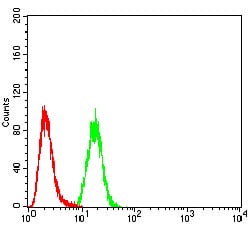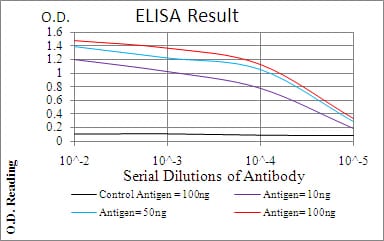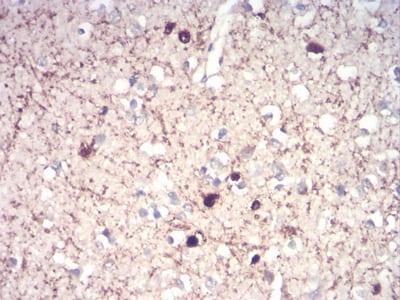


| WB | 1/500-1/1000 | Human,Rat,Hamster |
| IF | 1/20 | Human,Rat,Hamster |
| IHC | 咨询技术 | Human,Rat,Hamster |
| ICC | 1/50-1/200 | Human,Rat,Hamster |
| FCM | 咨询技术 | Human,Rat,Hamster |
| Elisa | 咨询技术 | Human,Rat,Hamster |
| Aliases | CR; CAL2; CAB29 |
| Entrez GeneID | 794 |
| clone | 1F5H1 |
| WB Predicted band size | 31.5kDa |
| Host/Isotype | Mouse IgG1 |
| Antibody Type | Primary antibody |
| Storage | Store at 4°C short term. Aliquot and store at -20°C long term. Avoid freeze/thaw cycles. |
| Species Reactivity | Human |
| Immunogen | Purified recombinant fragment of human CALB2 (AA: 1-271) expressed in E. Coli. |
| Formulation | Purified antibody in PBS with 0.05% sodium azide |
+ +
1. **"The PI3K pathway in human disease" by Cantley, L.C. (2006)**
- 作者讨论了PI3K信号通路在癌症、糖尿病等疾病中的作用,重点分析了p85α亚基的结构功能及其在调控PI3K活性中的机制,并提及使用p85α抗体进行蛋白质相互作用研究。
2. **"Impaired B cell development and proliferation in absence of phosphoinositide 3-kinase p85α" by Fruman, D.A. et al. (1998)**
- 该研究通过基因敲除模型揭示p85α对B细胞发育的关键作用,利用特异性抗体验证p85α蛋白在免疫细胞中的表达缺失及其对PI3K信号的影响。
3. **"Oncogenic PI3K signaling promotes growth and survival of human lung cancer cells with EGFR mutations" by Engelman, J.A. et al. (2006)**
- 研究通过Western blot和免疫沉淀实验,使用p85α抗体证明EGFR突变肺癌细胞中PI3K通路异常激活,并探讨其作为治疗靶点的潜力。
4. **"The phosphatidylinositol 3-kinase–AKT pathway in human cancer" by Vivanco, I. & Sawyers, C.L. (2002)**
- 综述总结了PI3K-AKT通路在肿瘤发生中的作用,其中p85α抗体被用于分析不同癌症模型中该亚基的表达水平及突变情况。
**Background of PI3 Kinase p85 Alpha Antibody**
The PI3 Kinase (phosphoinositide 3-kinase) p85 alpha antibody is a crucial tool for studying the regulatory subunit (p85α, encoded by *PIK3R1*) of Class IA PI3Ks, which play pivotal roles in cell growth, survival, and metabolism. The p85α subunit binds to the catalytic p110 subunit to form a heterodimer, stabilizing the enzyme and suppressing its activity under basal conditions. Upon receptor tyrosine kinase (RTK) activation, p85α recruits PI3K to the plasma membrane via its SH2 domains, enabling p110-mediated phosphorylation of phosphatidylinositol (4.5)-bisphosphate (PIP2) to PIP3. a key secondary messenger in the PI3K/Akt/mTOR signaling pathway.
This antibody is widely used to detect p85α expression in various applications, including Western blotting, immunohistochemistry (IHC), and immunoprecipitation, helping researchers investigate PI3K regulation in cancer, diabetes, and immune disorders. Dysregulation of p85α, such as mutations or altered expression, is linked to tumorigenesis, insulin resistance, and inflammatory diseases. For instance, *PIK3R1* mutations disrupt PI3K signaling, contributing to uncontrolled cell proliferation in cancers.
Commercial p85α antibodies are often raised against specific epitopes (e.g., N-terminal, C-terminal, or SH2 domains) and validated for specificity across human, mouse, or rat samples. Their utility extends to preclinical studies targeting PI3K pathway inhibitors, underscoring their importance in both basic research and therapeutic development. Proper controls (e.g., knockout cell lines) are essential to confirm antibody specificity due to homology among p85 isoforms (p85α, p85β, p55γ).
×